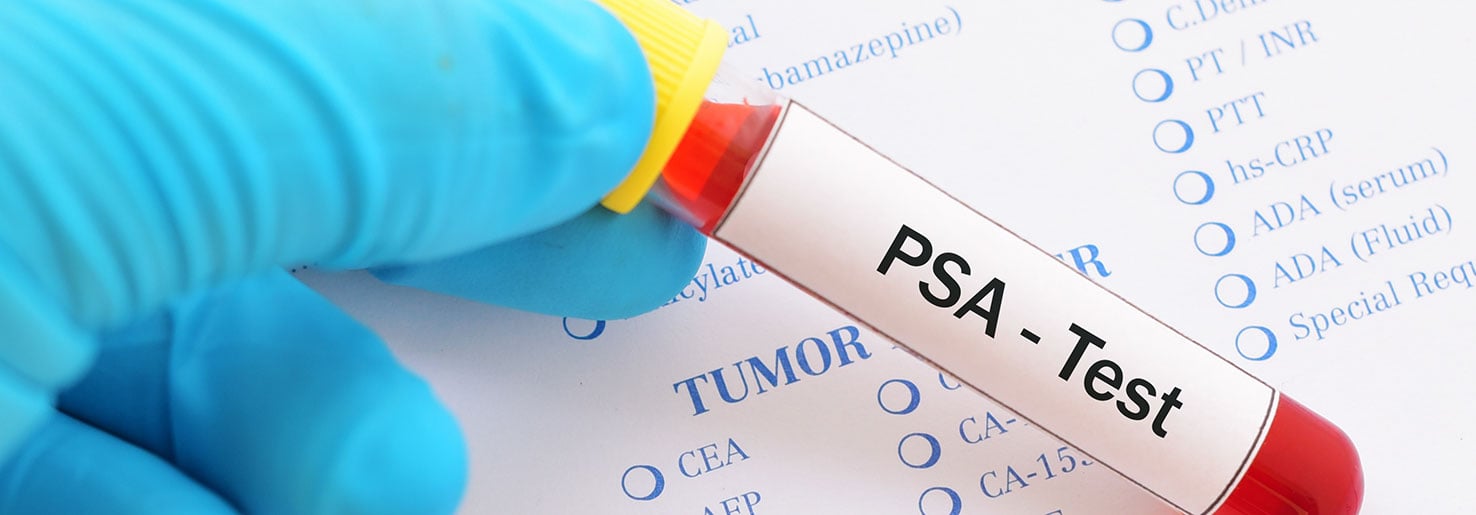
Prostate-Specific Antigen (PSA) Test
Commonly used to screen for prostate cancer, the prostate-specific antigen test is a blood test that measures the level of a specific protein (PSA) in the bloodstream. Through this relatively simple screening method, it may be possible to detect prostate cancer early, before it causes symptoms or spreads beyond the prostate. This is important because early-stage prostate cancer often responds well to treatment.
The PSA test is not appropriate for everyone, mainly because it carries a risk of overdiagnosis. Some prostate cancers detected through PSA testing will never cause symptoms or become life-threatening.
For routine screening purposes, a physician may suggest a PSA test for a man who is between the ages of 50 and 70 or a younger man who has a known prostate cancer risk factor, such as obesity or a family history of prostate cancer. In addition to the PSA test, prostate cancer screening often includes a digital rectal exam (DRE), which allows a physician to manually assess the prostate and feel for lumps and hardened areas by inserting a gloved, lubricated finger into the rectum.
What is PSA and how does it relate to prostate cancer?
PSA is a protein produced by both healthy and cancerous prostate cells. Therefore, PSA is normally found in semen and a small amount circulates in the bloodstream. Because cancerous cells usually produce more PSA than healthy cells, an elevated PSA blood level may indicate prostate cancer.
The higher the PSA level, the more likely a prostate issue is present. However, PSA levels can vary widely among individuals, and there is no clear-cut normal or abnormal PSA test result (score). When interpreting a PSA score, a physician will consider several factors, including the patient’s age, medical history and the size of his prostate. Here are some general guidelines:
- In men between ages 40 and 60, the median PSA score is 0.6 to 0.7 ng/ml. A PSA score greater than 2.5 ng/ml may be considered abnormal.
- In men between ages 60 and 70, the median PSA score is 1.0 to 1.5 ng/ml. A PSA score greater than 4.0 ng/ml may be considered abnormal.
Additionally, a PSA score that rises more than 0.35 ng/ml in a single year may be considered abnormal.
Does a high PSA score always indicate prostate cancer?
The PSA test was once considered the gold standard for prostate cancer screening, but it is not infallible. In addition to prostate cancer, an elevated PSA blood level can also be caused by:
- Advanced age (PSA levels generally increase over time)
- Inflammation of the prostate (prostatitis)
- Enlargement of the prostate due to benign prostatic hyperplasia (BPH)
- A urinary tract infection (UTI)
- The use of certain medications, such as finasteride and dutasteride
- A previous medical procedure that affected the tissues surrounding the prostate, such as the placement of a catheter into the bladder
What if the result of a PSA test is abnormal?
The PSA test can detect high levels of PSA in the blood, but it does not provide precise diagnostic information about the condition of the prostate or conclusively indicate cancer. Depending on the initial result, a physician may suggest repeating the test. If the second PSA test produces an abnormal result and/or the physician detects a lump during a DRE, the physician may order follow-up testing, such as:
- A transrectal ultrasound
- A magnetic resonance imaging (MRI) scan
- Further blood work, such as an IsoPSA test, which evaluates the chemical structure of PSA in addition to its concentration
- A prostate biopsy, such as a transperineal ultrasound-guided prostate biopsy
A biopsy is the only way to conclusively diagnose prostate cancer. During this procedure, a physician inserts a hollow needle through the rectum wall to collect prostate tissue samples. The samples are then sent to a lab for evaluation by a pathologist, who can identify cancerous cells when examining the tissue under a microscope.
Benefit from world-class care at Moffitt Cancer Center
If you have a high PSA level and require further testing, you can be screened for prostate cancer at Moffitt. To request an appointment with a specialist in our Urologic Oncology Program, call 1-888-663-3488 or submit a new patient registration form online.
